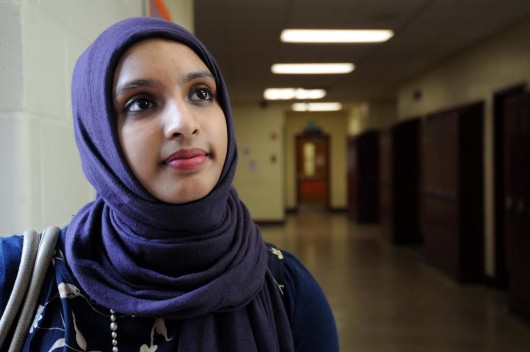
Towson high school student Amara Majeed has provided commentary for CNN on issues affecting the Muslim community. She founded The Hijab Project, which is meant to foster social awareness of prejudice in the United States against girls and women who wear head-scarves. She also wrote a book of biographies on Muslims to help dispel disparaging opinions that people have of Muslims. (Algerina Perna/Baltimore Sun/TNS)
It’s rough for Muslim women around the globe.
They’re oppressed in Syria, Iraq, Somalia, Nigeria, India and Saudi Arabia, among other places.
For many of them, waking up in the morning to attend school is a dream. Driving a car is a dream. Many are beaten, raped and dismissed so frequently it’s second nature.
What’s the response from most leaders in those countries? “Islam does not allow it” or that “It’s God’s laws, not men.” The truth, however, is that it’s not Islam. It’s not God’s law. It’s culture.
Most people believe Saudi Arabia not allowing women to drive is because Islam prohibits it, but that’s completely bulls—. There’s not a single mention in the Holy Quran that says so. Islam regards women as jewels and ones to be protected. After all, women of all religions do the harder labor — literally, they’re in labor delivering the world’s population. Respect.
Many people assume that Muslim women in the United States of America are considered free. Again, that’s BS. They are not as constrained in a small box as other countries, but they are still placed in a box — one with a little more room.
Instead of not being allowed to drive, they’re not allowed to wear a hijab — a veil that covers the head and chest, usually worn by Muslim women when in public — for certain jobs.
This problem mostly rises in employment with government jobs, like the police force.
Recently, The Columbus Dispatch reported a Somali-American and Muslim woman, Ismahan Isse, dropped out of the Columbus police academy after being informed hijabs are not allowed to be worn by officers. The division refused to change the policy and was backed by Columbus Mayor Michael Coleman.
“I strongly believe that our police force needs to be reflective of every corner of our city,” said Coleman to The Dispatch during an interview.
With all due respect to Mayor Coleman, the above quote does not make sense at all. Isn’t hijab “reflective” of the city’s large Muslim population? Aren’t Muslim women one corner of the city?
This situation saddens me because it’s another case of a Muslim woman not seeing her dream come to fruition because society, specifically America, hasn’t adapted to her.
Most have fled to the states from their home countries to live a life of potential and have the opportunity to pursue happiness to its full capacity. And that is a journey Isse was on when she earned her associate degree in criminal justice and then entered the police academy.
There is good news for Isse: She has received offers to join the Edmonton Police Service in Alberta, Canada. She told The Dispatch that she is considering joining, but has not made up her mind yet. The police service in Edmonton has designed uniforms to accommodate candidates, but they do not have any female Muslim officers yet.
Other cities around the country like St. Paul, Minnesota, have accommodated Kadra Mohamed, who is their first female Muslim police officer.
But I think one fear that’s holding America back is the fear of radical Islam “taking over.”
It’s not only in the states where Muslim women face these hurdles. After the January 2015 attacks on the satirical news magazine Charlie Hebdo and a supermarket in France, many Muslim women have faced backlash for wearing hijabs in public. A professor at the University of Paris 13 told France24, a news organization based in Paris, that he does not support “religious symbols in public places,” referring to a student in his class wearing a hijab.
I’m Muslim and I have two sisters. Both wear hijabs by choice, not by force. I’m fearful that they will be restricted as to where they can go and where they can work.
It’s wrong and idiotic for Muslim women to receive backlash around the world when they are the most innocent. They have kind hearts, they work hard — incredibly hard — for the people they love and everyone else.
I think it’s time that we all, regardless of where we’re from or what religion we practice, lend a hand so that Muslim women can live a life full of prosperity.


